Hurricanes, Cephalopods, and Human Ingenuity: Your Climate Readings for February
Amy Brady Recommends Five Books for Waking Up to Reality
Even though it’s officially behind us, 2020 continues to offer surprises. Among them? It’s tied with 2016 for the hottest year on record. That’s surprising, because 2020 didn’t experience a major El Niño event, which had a significant effect on global temperatures four years ago. No, last year got hot for a much scarier reason: humans.
Our carbon emissions—which actually dropped briefly in the spring when the pandemic first began to rage—warmed the planet mostly on their own. Even scarier, the Arctic was one of the hottest places on Earth. At one point, the Siberian town of Verkhoyansk reached 100.4 degrees Fahrenheit, marking the first time in recorded history that the Arctic Circle’s temperature surpassed three digits.
These facts should be enough to move international leaders to action. But if facts alone could achieve real change in the world, we would have already seen that change. Where mere statistics fall short, stories can help. They give narrative shape to facts so that readers can see—can really grasp—how climate change is forever altering the planet. This month, several books are hitting shelves that, through vivid storytelling and beautiful prose (and poetry!), make clear the urgency of the climate crisis. These are five of my favorites.
*
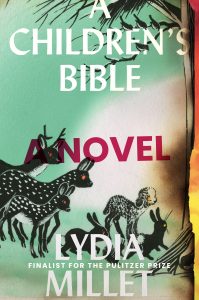
Lydia Millet, A Children’s Bible
(W. W. Norton & Company)
Out this month in paperback, A Children’s Bible is perhaps Lydia Millet’s best novel to date. It follows a group of adult friends and their children on a seaside vacation that’s rendered tragic when a ferocious hurricane makes landfall near their cabin. As the adults grow indifferent toward their increasingly dire circumstances, the children become caretakers and strategists. They devise a plan to survive, even as the electricity goes out, the land floods, the food runs short, and danger looms everywhere. The novel, which was a finalist for a 2020 National Book Award, is a pointed damnation of how little the older generations have done to combat climate change and an ode to the passion of young activists.
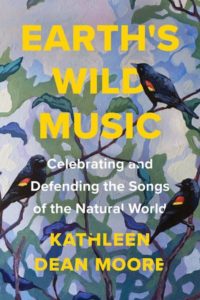
Kathleen Dean Moore, Earth’s Wild Music: Celebrating and Defending the Songs of the Natural World
(Counterpoint)
“After a time,” writes Kathleen Dean Moore in her splendid nonfiction book Earth’s Wild Music, “loving the world became more complicated, and rejoicing got harder.” That’s because, she continues, the world is “slipping away.” In her latest, the award-winning nature writer collects new and selected essays about the calls, howls, and shrieks of the natural world. Taken together, the essays demonstrate the many ways in which a nature lover can celebrate and advocate for the beauty of Earth, even as it faces widespread, human-caused destruction.
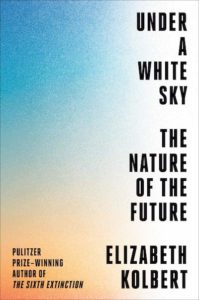
Elizabeth Kolbert, Under a White Sky: The Nature of the Future
(Crown)
The Pulitzer Prize-winning author of The Sixth Extinction returns with Under a White Sky, an examination of the complex solutions humanity has come up with to correct the ecological damage we’ve already inflicted. Kolbert travels around the world, from New Orleans to Australia, to speak with biologists, engineers, and other experts about their fascinating—and sometimes terrifying—experiments involving geoengineering, gene editing, flood control, and other things. Shot through with dark humor (because even at our worst, humans are still pretty funny), Under a White Sky reveals that human ingenuity has never been perfect, but that it’s probably more necessary now than ever before.
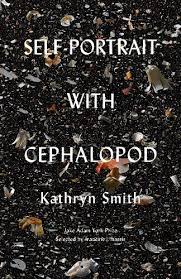
Kathryn Smith, Self-Portrait with Cephalopod
(Milkweed Editions)
Brimming with both anxiety and hope, Kathryn Smith’s Jake Adam York Prize–winning poetry collection, Self-Portrait with Cephalopod, captures what it’s like to live during a time of accelerated climate change. It opens with a poem about the small things we do to steel ourselves against despair. In another entitled “Spell to Turn the World Around,” the narrator collects injured birds, vows to use less water, and drives to the grave site of a firefighter who died on his way to extinguish wildfires. Smith’s vivid and deeply moving poetry raises questions about how to live ethically and with optimism in the face of so much loss.
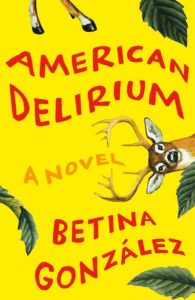
Betina González and translated by Heather Cleary, American Delirium
(Henry Holt & Co.)
American Delirium is Argentinian writer Betina González’s bewitching English debut, deftly translated from the Spanish by Heather Cleary. The novel isn’t explicitly about climate change, but it speaks to how global warming has rendered the natural world strange to us. Set in the Midwest, it features a deer population that attacks humans, a group of retirees who form the region’s first offense against the animals, and a Caribbean taxidermist working at a local natural history museum who figures out why the deer have grown violent. With piercing insight and prose that evokes the literary flair of César Aira, American Delirium is a surreal exploration of environmental imbalance.




















